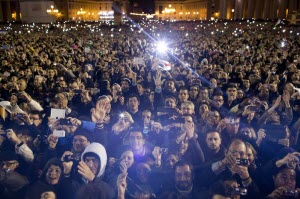
 S SOMEONE WHO WENT TO HIGH SCHOOL in the 90s, I am quite familiar with the cliché, “live for the moment.” It was everywhere when I was young: this mentality that we need to forget about tomorrow and live it up today, and I thought it silly. How interesting that, liturgically, I think the exact opposite now.
S SOMEONE WHO WENT TO HIGH SCHOOL in the 90s, I am quite familiar with the cliché, “live for the moment.” It was everywhere when I was young: this mentality that we need to forget about tomorrow and live it up today, and I thought it silly. How interesting that, liturgically, I think the exact opposite now.
Something odd struck me when I was watching the recent election of Pope Francis on television. There were thousands of people gathered in St. Peter’s Square, and almost every one of them was holding a smart phone or tablet, recording the proceedings. The people weren’t content just to be there; they wanted to record the event for posterity.
There is nothing wrong with this particular instinct. It seems quite human to me. When you witness something historical, beautiful, or otherwise remarkable, you want to save that moment, preserve it so you can revisit it in the future. How many blogs have you seen with extensive pictures or video of a particularly beautiful Mass, or a truly prayerful liturgical song?
What worries me about this phenomenon is not the technological novelty of it. I’ve wanted the kids to get off my lawn long before the smart phone. What troubles me is the inability to exist in a beautiful moment for its own sake. For every video or picture of a beautiful liturgy you see online, there was an individual standing, at Mass, recording it. When we watched the announcement of Pope Francis on TV, we were witnessing history. I couldn’t help but think, “Oh, I wish I could be there.” But then, most everyone there wasn’t really taking in what was going on around them; they were viewing it through a camera lens.
Nowhere is this phenomenon more evident than at the Nuptial Mass. Since more people dive right into the Big Business of weddings, there is almost no awareness of liturgical presence at all. Every single aspect of most weddings is scripted, right down to “fake exits” to get just the right picture. That’s not real. That’s not liturgy. That’s posing for an event that never happened. There’s a reason why many couples say, in hindsight, that they remember very few things about their wedding day. It is because they didn’t worship, didn’t celebrate, and didn’t live. They posed for pictures to be experienced on a later date.
The earthly liturgy exists in time. It is a temporal experience. Sure, it is a participation in the eternal heavenly liturgy, but we do not directly experience that timelessness. Ask any choir, and they’ll tell you that one of the greatest and simultaneously most frustrating aspects of liturgical music is that you prepare quite some time to execute a piece, then you sing it at Mass, and then it’s done. There’s another Mass next week to prepare for, and unlike Broadway, there’s no second show tomorrow.
How much more do we need to allow ourselves to become absorbed in the temporality of liturgy? Focus on the beauty of music, of art, of Word, and of the miracle going on at Mass. You get, maybe, an hour to 90 minutes of the Mass on a Sunday. Exist in the moment, and enjoy the short glimpse of eternity you get. Stop worrying about recording it for later; the liturgy, like music, exists in time. Stop being an observer and be a participant.

